Tech
US firms up $6.2 bn Micron funding to boost chipmaking
Published
2 months agoon
By
Ekwutos Blog
US President Joe Biden’s administration finalized nearly $6.2 billion in funding for Micron Technology on Tuesday, firming up a deal to boost domestic semiconductor production before Donald Trump returns to the White House.
The Biden administration has been working to green-light agreements with firms in the chip making supply chain over recent months, hoping to cement it as part of his legacy before leaving office in January.
Once a deal is finalized, funds can start heading to companies when they hit certain milestones.
The Micron investment helps bring development and production of advanced memory semiconductor technology to US shores, said Commerce Secretary Gina Raimondo.
This “is crucial for safeguarding our leadership on artificial intelligence and protecting our economic and national security,” she added in a statement.
The United States has been trying to reduce its dependence on China and other countries for semiconductors.
In this case, Washington is keen to build up a reliable domestic supply of chips that can go into advanced technologies ranging from personal computing to artificial intelligence — including enabling new AI models.
The latest funding comes under the CHIPS and Science Act, a major law passed during Biden’s term aimed at strengthening the US semiconductor industry.
‘Stable supply’
The Micron deal in particular supports the company’s two-decade plan, including investments of some $100 billion in New York and $25 billion in Idaho, said the Commerce Department.
This should create some 20,000 jobs and help the US grow its share of advanced memory manufacturing, the department added.
Apart from the efforts in New York and Idaho, the Commerce Department also signed a preliminary agreement with Micron for up to $275 million in proposed funding to expand and modernize its facility in Virginia.
The aim is to support a “stable supply” of Micron’s technology, involving chips that are key to the automotive and industrial markets, the department noted.
“Memory chips are foundational to all advanced technologies,” Raimondo said.
“As the only US-based manufacturer of memory, Micron is uniquely positioned to bring leading-edge memory manufacturing to the US,” said Micron President Sanjay Mehrotra in a statement.
The United States used to make nearly 40 percent of the world’s chips but this proportion is now around 10 percent, with none being the most advanced chips.
While the US government has unveiled over $36 billion in grants through the CHIPS Act, some of the funds remain in a due diligence phase and cannot yet be disbursed until agreements are made final.
You may like


LAND OWNERSHIP IN NIGERIA: SETTING THE RECORD STRAIGHT- Hon Success Opara


Renowned Comedian Alibaba’s Spouse Shares Enchanting Snap of Their Trio of Bundles of Joy to Commemorate Their First Year of Life


Victor Osimhen Responds to Allegations of Assaulting Turkish Journalist


Stop dragging our father’s name into public conversations- late Alaafin of Oyo’s children threaten legal action against Queen Dami


ASSUMPTA FLYOVER: CAN URGES RELIGIOUS AND COPORATE BODIES TO COOPERATE WITH IMO GOVT


Ending Russia’s war in Ukraine this year is possible, says ex-NATO chief Stoltenberg
Tech
Electric cars now MORE reliable than petrol and diesel counterparts
Published
10 hours agoon
January 24, 2025By
Ekwutos Blog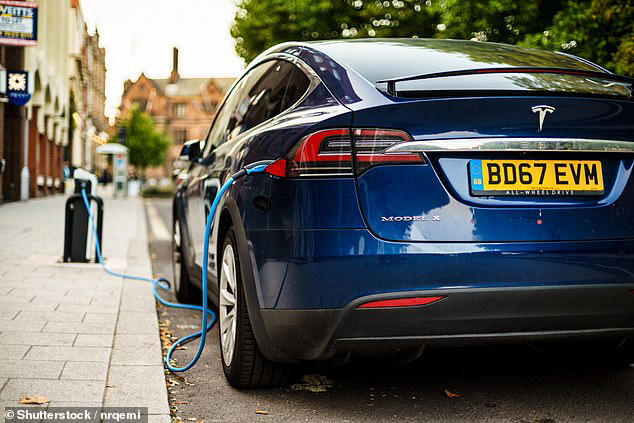
Electric vehicle (EVs) sales have slumped in Britain, with the public struggling to fall in love with the technology.
A shortage of public chargers fuels ‘range anxiety’ among motorists worried about where they can top up their batteries, while high prices have also put off would-be buyers.
Despite these fears, a new study claims that EVs are even more reliable than traditional cars and vans with petrol and diesel engines.
Researchers from the University of Birminghamand the London School of Economics (LSE), analysed the ‘health’ of nearly 300 million vehicles on UK roads.
Their analysis found that battery electric vehicles (BEVs) not only had a lower likelihood of failure, but also a comparable lifespan to traditional cars and vans.
According to the team, this marks a ‘pivotal moment in the drive towards sustainable transportation’.
Co-author Dr Viet Nguyen-Tien, from the LSE, said: ‘Our findings provide critical insights into the lifespan and environmental impact of electric vehicles.
‘No longer just a niche option, BEVs are a viable and sustainable alternative to traditional vehicles – a significant step towards achieving a net-zero carbon future.’
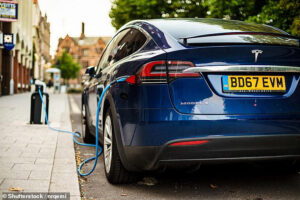
A new study claims that EVs are even more reliable than traditional cars and vans with petrol and diesel engines
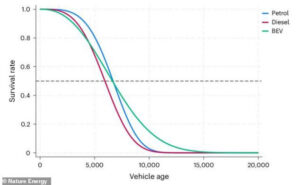
Their analysis found that battery electric vehicles (BEVs) not only had a lower likelihood of failure, but also a comparable lifespan to traditional cars and vans
In the study, the team used nearly 300 million UK Ministry of Transport test records to analyse UK vehicles from 2005 to 2022.
This allowed them to estimate the reliability and longevity of each vehicle.
Their analysis revealed that BEVs demonstrated the most rapid improvement in reliability, with a 12 per cent lower likelihood of failure for each successive year of production.
For comparison, these figures were only 6.7 per cent and 1.9 per cent for petrol and diesel vehicles, respectively.
In addition, the results revealed that BEVs now have an average lifespan of 18.4 years and can travel up to 124,000 miles.
Petrol cars have a slightly longer average lifespan of 18.7 years, but with a lower mileage of 116,000 miles.
Meanwhile, diesel cars have a higher mileage (159,000 miles), but a shorter lifespan of 16.3 years.
As part of the study, the team also identified the top-performing brands in terms of vehicle longevity.

In the study, the team used nearly 300 million UK Ministry of Transport test records to analyse UK vehicles from 2005 to 2022 (stock image)
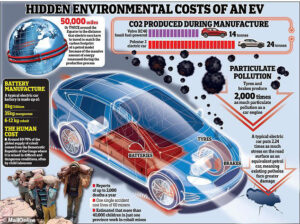
EVs have lower greenhouse gas emissions overall when compared with conventional cars, but there are some hidden environmental costs of an electric car
Among BEVs, Tesla leads the charge, while Audi is the best performer for petrol, and Skoda is the top for diesel.
‘BEVs offer significant environmental benefits, especially as Europe switches to a more renewable energy mix,’ said study co-author Robert Elliott, Professor of Economics at the University of Birmingham.
‘Despite higher initial emissions from production, a long-lasting electric vehicle can quickly offset its carbon footprint, contributing to the fight against climate change – making them a more sustainable long-term option.
‘Our findings offer consumers reliable data to make informed decisions about their vehicle purchases, whilst policymakers can use our insights to shape regulations and incentives that promote the adoption of durable and environmentally friendly vehicles and plan ahead their end-of-life treatment.’
However, the study comes as sales of electric cars have slowed in Britain.
A shortage of public chargers fuels ‘range anxiety’ among motorists worried about where they can top up their batteries, while high prices have also put off would-be buyers.
Electric vehicles run on energy from a charged battery much like a smartphone but come with hefty pricetags – around £46,000 on average in the UK.
‘Electric vehicles typically cost more upfront,’ say Milad Haghani, lecturer in urban analytics at UNSW Sydney, and Hadi Ghaderi, a supply chain professor at Swinburne University of Technology, in a piece for The Conversation.

Their analysis revealed that BEVs demonstrated the most rapid improvement in reliability, with a 12 per cent lower likelihood of failure for each successive year of production. For comparison, these figures were only 6.7 per cent and 1.9 per cent for petrol and diesel vehicles, respectively
‘Sales have slowed in parts of Europe and the United States often due to reduced incentives, but strong sales growth continues in other regions such as China and India.’
The two experts say a ‘flood of cheaper Chinese vehicles’ is lowering the cost barrier.
However, these Eastern exports have triggered surveillance fears.
Another ‘major issue’ for car buyers is uncertainty about an electric model’s resale value compared to a standard petrol or diesel, the researchers point out.
‘Consumers are concerned electric vehicles depreciate faster than traditional cars… these concerns are particularly tied to battery degradation, which affects a car’s range and performance over time.’
Meanwhile, EV fires have made headlines globally – including a high-profile battery fire in a Korean parking lot in August – creating doubts among consumers.
Tech
Globacom CEO Ahmad Farroukh resigns after one month amid governance challenges
Published
2 days agoon
January 22, 2025By
Ekwutos Blog
Globacom CEO Ahmad Farroukh resigns after one month amid governance challenges
Frank Eleanya (Ekwutosblog)
Jan 21, 2025
Ahmad Farroukh, who was appointed CEO of Nigerian telecom giant Globacom in October 2024, resigned after just one month in the role, multiple sources close to the matter confirmed. While Globacom has not issued an official statement or communicated the resignation internally, several industry insiders suggest the decision was linked to significant challenges within the company’s organisational structure.
A mid-level manager at Globacom, speaking on the condition of anonymity, speculated Farroukh’s departure was tied to problems with the organisational setup. A top-level executive at the Nigerian Communications Commission (NCC) who asked not to be named confirmed Farroukh’s exit but declined to share specifics.
Globacom did not respond to multiple requests for comments.
Farroukh’s abrupt resignation highlights significant internal challenges at the company, which has long been criticised for its centralised decision-making process. According to a former Globacom executive, the company’s founder, Mike Adenuga, is key to most decisions within the company. Adenuga has managed the telecom giant alongside his other business interests, including oil and gas, financial services, and real estate, with minimal structural separation between his other ventures and Globacom’s operations.
This approach has historically worked for the company but may have presented obstacles for Farroukh, whose experience at more structured organizations like MTN and Airtel might have led him to expect a different level of operational autonomy.
Farroukh’s departure also comes when Globacom is facing heightened regulatory scrutiny. In late 2024, the NCC’s sector audit revealed that over 40 million subscribers were not properly registered with their National Identification Numbers (NIN), violating government regulations. This led to a significant loss of market share, with Globacom’s share of the Nigerian mobile market shrinking by approximately 60%, leaving it with just 12%.
Globacom has also faced ongoing cybersecurity issues, including a high-profile hack in 2023 that exposed the personal data of millions of its subscribers. These issues may have created an environment where Farroukh’s leadership efforts could not make a meaningful impact quickly.
“A CEO leaving in one month is unprecedented in the industry. The NCC can investigate the reason for his exit. The commission can seek an explanation from the CEO, who is not obligated to respond, or from the company because this is about corporate governance, which the NCC Act covers,” said Ayoola Oke, a former Special Adviser to the former Executive Vice-Chairman of NCC, Ernest Ndukwe.
Globacom’s leadership void following Farroukh’s departure will raise questions about the company’s ability to navigate its ongoing internal challenges and regain its competitive edge. Without significant structural changes, it is unclear how Globacom can address the organizational weaknesses that led to Farroukh’s exit.

TikTok, the wildly popular Chinese-owned app, is resuming operations for its 170 million American users after President-elect Donald Trump announced he would extend the app’s stay in the US.
The platform had gone dark on Sunday, following concerns over potential data access by Chinese officials.
In a statement, TikTok thanked Trump for his clarity and pledged to work on a “long-term solution” to remain in the United States. Trump, posting on Truth Social, vowed to issue an executive order on Monday to delay prohibitive measures and secure a deal to safeguard national security.
This comes after the Supreme Court upheld a law requiring TikTok’s parent company, ByteDance, to sell its US operations.
Previously supporting a ban, Trump has since praised TikTok’s influence, especially in engaging younger voters during his campaign.
SEE SCREENSHOT:
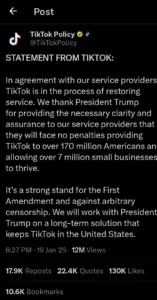

LAND OWNERSHIP IN NIGERIA: SETTING THE RECORD STRAIGHT- Hon Success Opara

Renowned Comedian Alibaba’s Spouse Shares Enchanting Snap of Their Trio of Bundles of Joy to Commemorate Their First Year of Life

Victor Osimhen Responds to Allegations of Assaulting Turkish Journalist
Trending
- Politics11 months ago
Nigerian Senate passes Bill seeking the establishment of the South East Development Commission.

 Business11 months ago
Business11 months agoInflation hits record high of 29.90% on naira weakness

 Politics8 months ago
Politics8 months agoBREAKING: Federal Gov’t Offers To Pay Above N60,000, Reaches Agreement With Labour

 SportsNews11 months ago
SportsNews11 months agoOlympic Qualifiers 2024: CAF Confirms Dates For Super Falcons Vs Banyana Banyana

 Trending3 months ago
Trending3 months agoNYA demands release of ‘abducted’ Imo chairman, preaches good governance
- Business3 months ago
US court acquits Air Peace boss, slams Mayfield $4000 fine

 Politics3 months ago
Politics3 months agoMexico’s new president causes concern just weeks before the US elections
- Entertainment3 months ago
Bobrisky transferred from Immigration to FCID, spends night behind bars

